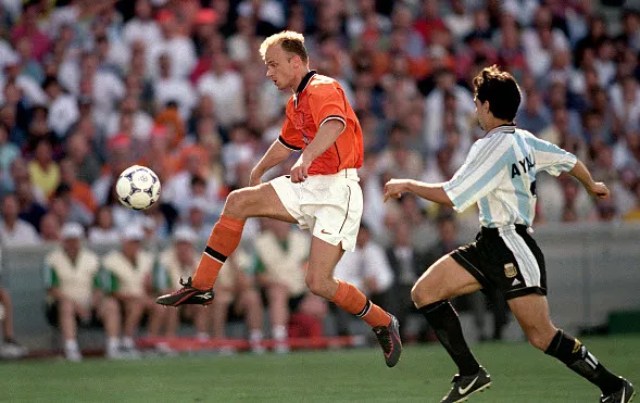Most people believe Bergkamp’s decision to stop flying stemmed from two incidents at the 1994 World Cup, which we will come onto.
However, there was an incident in 1989, when Bergkamp was just 20, which resulted in the loss of several close friends.
The Surinam Airways crash in Paramaribo claimed the life of Ajax teammate Lloyd Doesburg, as well as Virgall Joemankhan, who played for the club’s academy alongside Bergkamp.
Many of the 176 victims were footballers in the Dutch league, who were travelling from Amsterdam to Suriname to compete in a charity event.

Rumours have suggested Bergkamp, as well as Ruud Gullit and Frank Rijkaard, wanted to play but were denied permission by their clubs.
Two other teammates of Bergkamp’s at the time, Henny Meijer and Stanley Menzo, escaped death by taking an earlier flight after ignoring Ajax’s decision.
For five years after that, Bergkamp got on planes, but has since revealed he always hated it – and not in an ordinary way.
This wasn’t about holding the hand of the stranger next to him because of some pre-flight nerves, Bergkamp would physically shake and break out in a cold sweat.
The last straw was the 1994 World Cup in the USA, which required more air travel than your average event.

There was mass panic on the Dutch team’s flight to the tournament when the engine briefly cut out, although this was eventually fixed.
Then, one of their flights during the World Cup was delayed after a Dutch journalist joked about having a bomb in his bag.
He was jailed, such was the seriousness of the situation.
Bergkamp has spoken about how the thought of flying would distract him during games, but he performed well at the 1994 World Cup and finished as his country’s top scorer.
However, matters were made worse when Inter Milan requested that Bergkamp return within ten days of Holland’s quarter-final exit.
Troubled by injuries and fatigue, he experienced a nightmare 1994/95 campaign at Inter, scoring just five times in 26 matches, and the club decided to sell him to Arsenal.
Upon joining the Gunners, he made it clear he would never fly again, a decision which cost him £100,000 in pay.


